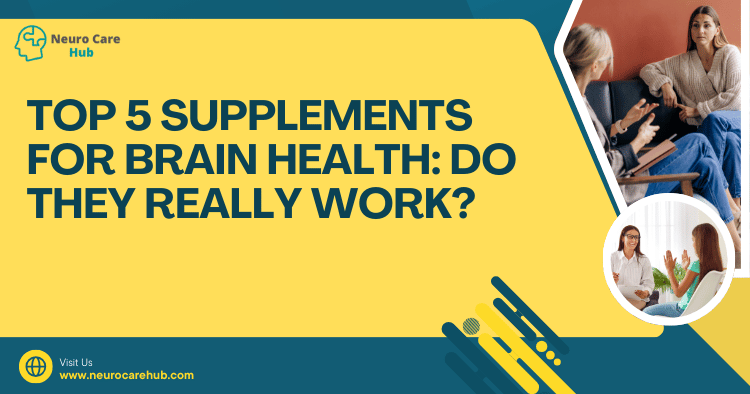Introduction
In our fast-paced world, maintaining brain health is more crucial than ever. Many people are turning to dietary supplements, hoping to enhance cognitive function, improve memory, and stave off cognitive decline. But do these supplements really work? In this article, we’ll explore the top five supplements that claim to boost brain health, their benefits, and the science behind them. So, let’s dive in!
Omega-3 Fatty Acids
What Are They?
Omega-3 fatty acids are essential fats found primarily in fish oil, certain algae, and flaxseeds. They are known for their anti-inflammatory properties and are crucial for brain health.
How Do They Work?
The two primary types of omega-3s that benefit brain health are EPA (eicosapentaenoic acid) and DHA (docosahexaenoic acid). DHA is a significant structural component of the brain and is vital for maintaining neuronal function.
Do They Really Work?
Numerous studies suggest that omega-3 fatty acids can improve cognitive function and may even reduce the risk of Alzheimer’s disease and dementia. A study published in Frontiers in Aging Neuroscience found that higher omega-3 levels are associated with better cognitive performance in older adults.
Furthermore, as noted in the Top 5 Benefits of Regular Neuro Check-Ups for Your Health, incorporating omega-3s in your diet can also support overall neurological health.
Recommended Dosage
Most experts recommend a daily intake of 500-1000 mg of combined EPA and DHA for general health. Always consult a healthcare provider before starting any new supplement.
| Source of Omega-3 | EPA (mg) | DHA (mg) |
|---|---|---|
| Salmon (3.5 oz) | 1,500 | 1,000 |
| Mackerel (3.5 oz) | 4,580 | 2,800 |
| Chia Seeds (1 oz) | 5 | 0 |
| Flaxseeds (1 oz) | 6 | 0 |
B Vitamins
What Are They?
B vitamins comprise a group of eight essential nutrients, including B6, B9 (folate), and B12, which play a vital role in brain health.
How Do They Work?
B vitamins are crucial for energy production, neurotransmitter synthesis, and the maintenance of myelin, the protective covering of nerves. They help reduce levels of homocysteine, an amino acid linked to cognitive decline.
Do They Really Work?
Research indicates that adequate levels of B vitamins can support brain health. A study in the American Journal of Clinical Nutrition demonstrated that supplementation with B vitamins significantly slowed cognitive decline in elderly individuals with mild cognitive impairment.
This is particularly relevant as neuro care becomes essential in modern medicine and addressing nutrient deficiencies is part of effective treatment plans.
Recommended Dosage
- B6: 1.3 mg
- B9 (Folate): 400 mcg
- B12: 2.4 mcg
Consult your healthcare provider for personalized recommendations.
Read about B Vitamins and brain health
Ginkgo Biloba
What Is It?
Ginkgo Biloba is an herbal supplement derived from the leaves of the Ginkgo tree. It’s been used in traditional medicine for centuries.
How Does It Work?
Ginkgo Biloba is believed to improve blood flow to the brain, which may enhance cognitive function and memory. It also has antioxidant properties that protect brain cells from damage.
Do They Really Work?
Research on Ginkgo Biloba has yielded mixed results. Some studies suggest that it can improve memory and cognitive speed, especially in older adults. A systematic review published in Cochrane Database of Systematic Reviews concluded that Ginkgo may be effective in improving cognitive function in people with dementia.
Recommended Dosage
Typically, a daily dosage of 120-240 mg of Ginkgo Biloba extract is suggested.
Find more information on Ginkgo Biloba
Curcumin
What Is It?
Curcumin is the active compound found in turmeric, a spice commonly used in Indian cuisine. It’s known for its anti-inflammatory and antioxidant properties.
How Does It Work?
Curcumin can cross the blood-brain barrier, which makes it particularly beneficial for brain health. It promotes the production of brain-derived neurotrophic factor (BDNF), a protein associated with improved cognitive function and a lower risk of neurodegenerative diseases.
Do They Really Work?
Studies have shown that curcumin may improve memory and mood in older adults. A study published in The American Journal of Geriatric Psychiatry found that curcumin supplementation improved memory and attention in older adults without dementia.
As highlighted in Top 5 Future Trends Shaping Neuro Care in 2024, integrating such supplements into a neuro care routine can be pivotal for cognitive enhancement.
Recommended Dosage
A common dosage is 400-600 mg of curcumin extract, taken two to three times a day.
Explore the benefits of Curcumin
Phosphatidylserine
What Is It?
Phosphatidylserine is a phospholipid found in the cell membranes of brain cells. It plays a key role in cellular function and communication.
How Does It Work?
Phosphatidylserine supports the production of neurotransmitters and helps protect brain cells from damage, making it essential for memory and cognitive function.
Do They Really Work?
Research indicates that phosphatidylserine supplementation can improve cognitive function in older adults and help reduce the cognitive decline associated with aging. A study in Alzheimer’s Disease and Associated Disorders found that it may improve attention and memory in individuals with cognitive decline.
Recommended Dosage
A typical dosage ranges from 100-300 mg per day.
Learn more about Phosphatidylserine
Conclusion
While the evidence supporting the efficacy of brain health supplements varies, many show promising results. Omega-3 fatty acids, B vitamins, Ginkgo Biloba, Curcumin, and Phosphatidylserine are among the most researched options, each contributing to cognitive health in unique ways.
As with any supplement, it’s essential to consult with a healthcare professional before starting to ensure they fit your individual health needs.
Incorporating these supplements into your diet, along with a healthy lifestyle, can support your brain health as you age.
FAQs
1. Are dietary supplements safe for everyone?
While many supplements are generally considered safe, they may interact with medications or may not be suitable for individuals with certain health conditions. Always consult a healthcare provider.
2. Can I get enough of these nutrients from food?
Yes, many of these nutrients can be obtained through a balanced diet rich in fish, leafy greens, nuts, seeds, and whole grains. Supplements should not replace a healthy diet.
3. How long does it take to see results from brain health supplements?
Results can vary depending on the individual and the supplement. Some people report improvements within a few weeks, while others may take longer.
4. Are there any side effects associated with these supplements?
Some individuals may experience side effects, such as digestive issues or allergic reactions. Always start with a lower dosage to assess tolerance.
By incorporating these supplements into your diet, along with a healthy lifestyle, you can support your brain health as you age.
Remember, though, that supplements are just one piece of the puzzle! For a deeper dive into neuro care, explore our resources on neuro care essentials.






